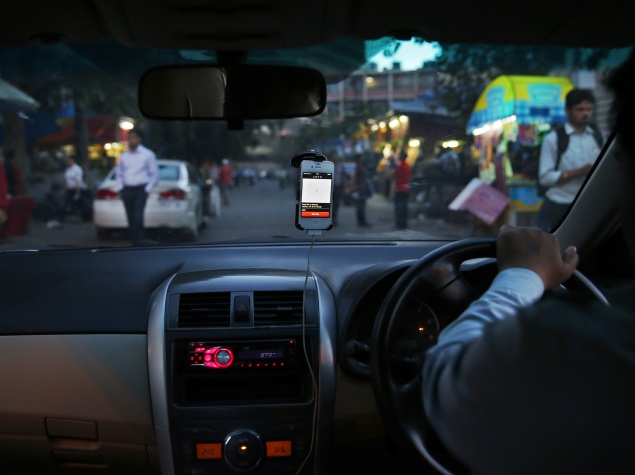Uber Office Raided in Southern China: Report

Officials from the public security, traffic, and industry and commerce authorities visited Uber's office on Thursday night and seized numerous iPhones, the Guangzhou-based Southern Metropolis Daily said.
The newspaper said authorities carried out the raid on the basis of their oft-repeated statements that the use of private vehicles for ride-sharing businesses is illegal in China, even as the popularity of Uber and its competitors soars.
US-based Uber, which puts customers in touch with private drivers in an alternative to traditional taxis, has become the focus of global controversy and is facing legal challenges and limits on its activities.
Leading the opposition are taxi companies that contend Uber drivers should be regulated in the same way as normal cabs.
Guangzhou authorities issued no public statements on the reported raid.
Uber said in response to a query from AFP that it is cooperating with local officials, though stopped short of confirming the reported raid.
"Uber prides itself on providing efficient and convenient transportation options for riders to get from point to point, helping cities reduce congestion pollution," it said.
"We have maintained open channels of communications and are working closely with local authorities in cooperation."
The popularity of private-car booking enterprises such as Uber and China's dominant taxi-hailing apps Kuaidi Dache and Didi Dache has soared in China, where traditional taxis are criticised for poor service with rude drivers who routinely pass customers on the street.
News of the raid was a top trending item Friday on Sina Weibo, a Chinese version of Twitter, as netizens criticised authorities over the move.
"Uber is more convenient than taxis, with good service," posted one user. "People need it."
Another suggested that Uber's popularity didn't sit well with traditional services.
Uber "has hurt some groups' interests and surely will be attacked", the post said.
Uber currently operates in nine cities across China, including the capital Beijing and financial hub Shanghai.
Chinese search engine Baidu, the country's equivalent of Google, said in December it had purchased a stake in the company.
E-commerce behemoth Alibaba has a stake in Kuaidi Dache, while Didi Dache is backed by technology giant Tencent.
Uber last month filed complaints with the European Union against France, Germany and Spain, hitting back at efforts to ban it from the continent's streets.
It said efforts by national governments to shut it down breached EU laws on competition and the single market.
Hungary on Thursday became the latest EU country to launch a probe into Uber, with the economy ministry saying that a tax audit had been ordered into its local unit.
Catch the latest from the Consumer Electronics Show on Gadgets 360, at our CES 2026 hub.
Related Stories
- Samsung Galaxy Unpacked 2025
- ChatGPT
- Redmi Note 14 Pro+
- iPhone 16
- Apple Vision Pro
- Oneplus 12
- OnePlus Nord CE 3 Lite 5G
- iPhone 13
- Xiaomi 14 Pro
- Oppo Find N3
- Tecno Spark Go (2023)
- Realme V30
- Best Phones Under 25000
- Samsung Galaxy S24 Series
- Cryptocurrency
- iQoo 12
- Samsung Galaxy S24 Ultra
- Giottus
- Samsung Galaxy Z Flip 5
- Apple 'Scary Fast'
- Housefull 5
- GoPro Hero 12 Black Review
- Invincible Season 2
- JioGlass
- HD Ready TV
- Laptop Under 50000
- Smartwatch Under 10000
- Latest Mobile Phones
- Compare Phones
- Red Magic 11 Air
- Honor Magic 8 RSR Porsche Design
- Honor Magic 8 Pro Air
- Infinix Note Edge
- Lava Blaze Duo 3
- Tecno Spark Go 3
- iQOO Z11 Turbo
- OPPO A6c
- Lenovo Yoga Slim 7x (2025)
- Lenovo Yoga Slim 7a
- Lenovo Idea Tab Plus
- Realme Pad 3
- Moto Watch
- Garmin Quatix 8 Pro
- Haier H5E Series
- Acerpure Nitro Z Series 100-inch QLED TV
- Asus ROG Ally
- Nintendo Switch Lite
- Haier 1.6 Ton 5 Star Inverter Split AC (HSU19G-MZAID5BN-INV)
- Haier 1.6 Ton 5 Star Inverter Split AC (HSU19G-MZAIM5BN-INV)







![[Sponsored] Haier C90 OLED TV | Dolby Vision IQ, 144Hz OLED and Google TV in Action](https://www.gadgets360.com/static/mobile/images/spacer.png)









